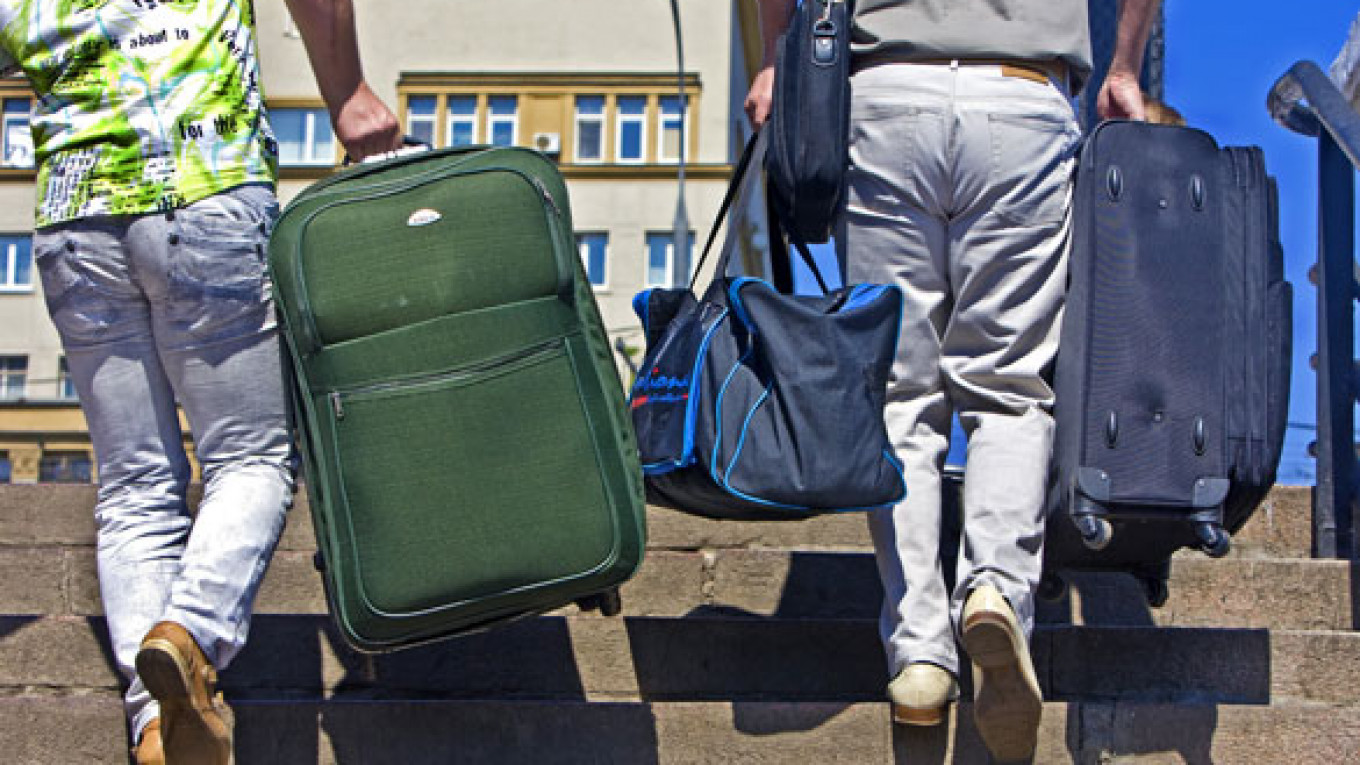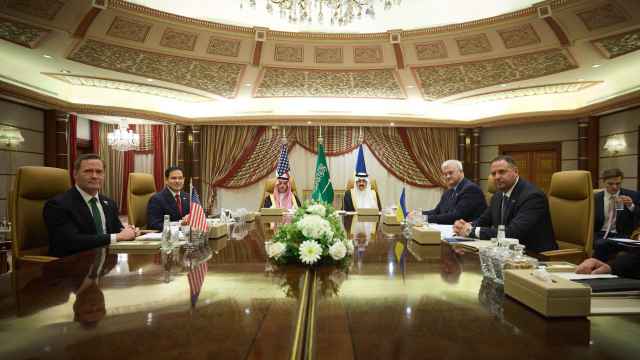Foreigners hoping to uproot their families and move to Russia face a major new headache: new customs fees that can run into the tens of thousands of dollars.
Moving companies said Wednesday that dozens of shipments that arrived after July 1 have been left stranded after customs officials told them that every kilogram after the first 50 would be slapped with a minimum charge of 4 euros ($5).
The tariffs, which emanate from a new customs union with Belarus and Kazakhstan, introduce a hurdle for the influx of foreign specialists advocated by President Dmitry Medvedev.
"This will not stimulate people to move to Russia," said Norbert Gooren, general manager at AAA Logistics, a U.S.-based international freight company.
Harry Kerbs, owner of Moscow-based movers IMS, said he currently had three trucks awaiting clearance at the Zelenograd customs point outside the capital. One of them faces a bill of 12,000 euros ($15,000) — payable in cash at any Sberbank office.
"I do not know how to raise the money because my client said he will reimburse me only later and through a bank account," an angry Kerbs said in a telephone interview.
Companies like IMS have been hit hard and unexpectedly by the new charges, which come right in the middle of the summer, the busiest season for family relocations.
The new regulations, spelled out on the Federal Customs Service's web site, stipulate that household items, formerly customs-exempt, will be treated like commercial goods upon entry into the country, except for a list of 21 items that are exempt, including jewelry, consumer electronics, baby strollers and pets.
Company representatives said that the list of exemptions, identified in Appendix 4 of the regulation, was pointless because the items on it usually make up only a tiny share of a household shipment.
The new tariff is officially supposed to amount to 30 percent of the movers' bill, but the regulation includes the minimum 4 euro-per-kilogram rule as a means against artificially low bills.
The only other exemption is the first 50 kilograms.
Shipments for diplomats and other governmental officials remain tax-free.
A family of five typically arrives with about 40 cubic meters of goods weighing 4,000 kilograms, Kerbs explained. "Subtract the exempt 50 kilos and you are left with a 15,800 euro ($20,000) bill," he said.
Industry representatives contacted by The Moscow Times said that while they had expected changes, they were caught off guard when customs officers told them about the new tariffs when the first shipments arrived this month.
"We found out the hard way last week," said Sherman Pereira, regional director of Crown Relocations.
Gooren, of AAA Logistics, said it took customs officials more than a week to adjust to the new rules, leading to a backlog at customs checkpoints.
"When we came to them early in July, they told us they would not work because they were still studying the customs union," he said by telephone from St. Petersburg.
Spokespeople at the customs service's press office directed calls to a customs hotline, where
Alexander Makulin, a hotline duty officer, said customs officials were just following the law. He conceded that the list of exceptions was too short. "Maybe they forgot to discuss the number of items on it," he said, referring to the authors of the customs union.
But he added that the list left little room for interpretation and that the customs service could not change the rules.
"We are law-takers and not lawmakers," he said.
But time is pressing.
Trucks have to pay a parking fee of 8,000 rubles ($260) every day that they wait at a customs point, and warehouse costs could be added to the amount if officials decide to unload the goods for inspection, Kerbs said.
Pereira, of Crown, said he was monitoring dozens of affected shipments and several clients had decided to send their goods back home after learning about the extra cost.
Still, he said, others who are less flexible have already paid up. "People have schools booked and paid deposits," he said.
This, he suggested, makes it unlikely that the new rules will be canceled by a government eager to collect extra revenues as it struggles with a budget deficit.
"It's a tricky situation," Pereira said.
At least one businessman offered a ray of hope, saying the new tariffs could be legally challenged if they caused a major burden. Dmitry Cheltsov, chairman of the Association of European Businesses' transportation and customs committee, said a significant worsening of shipping conditions would run counter to the Istanbul Convention on Temporary Admission.
"This stipulates that conditions must not differ significantly from other countries," he said.
Ironically, the new tariffs came into force on the same day as new immigration rules aimed at attracting foreign investment. The reform, backed by Medvedev, allows higher-salaried foreign employees to apply for new three-year visas and work permits, rather than the previous one-year papers.
Those new procedures, however, have also gotten off to a slow start, said Alexei Filipenkov, head of the Visa Delight agency. The new application forms only became available last week — well after July 1.
The main problem seems to be that the Federal Migration Service remains unsure of how to implement the new procedures. "Nobody seems to know how it works," Filipenkov said.
A Message from The Moscow Times:
Dear readers,
We are facing unprecedented challenges. Russia's Prosecutor General's Office has designated The Moscow Times as an "undesirable" organization, criminalizing our work and putting our staff at risk of prosecution. This follows our earlier unjust labeling as a "foreign agent."
These actions are direct attempts to silence independent journalism in Russia. The authorities claim our work "discredits the decisions of the Russian leadership." We see things differently: we strive to provide accurate, unbiased reporting on Russia.
We, the journalists of The Moscow Times, refuse to be silenced. But to continue our work, we need your help.
Your support, no matter how small, makes a world of difference. If you can, please support us monthly starting from just $2. It's quick to set up, and every contribution makes a significant impact.
By supporting The Moscow Times, you're defending open, independent journalism in the face of repression. Thank you for standing with us.
Remind me later.







